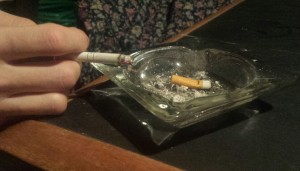WESTFIELD–Residents who smoke may be left with even fewer places to light up next year.
The Westfield Housing Authority (WHA) will be enacting a smoking ban in and around their housing units, starting April 1, 2017. The ban, though unrelated to the city council’s “Smoke Free Clean Air Act,” creates another hurdle for Westfield smokers if they get housing through WHA, which has over 420 units in Westfield and Southwick.
“It’s just the sign of the times,” Dan Kelly, executive director of WHA, said. “We’re one of the last housing authorities to go smoke-free.”
The ban will match the culture shift happening in America, as the country continues to go smoke-free. Bans in a variety of public places, including the act currently up for discussion in Westfield city council, as well as rising cigarette taxes, countless anti-smoking advertisements and even Major League Baseball implementing a ban on chewing tobacco are all signs of the culture shift.
This change has helped America quit, too. In 2015, the CDC found that about 15 out of every 100 Americans were current cigarette smokers. This was a decline of about 25 percent from 2005, which found about 21 out of every 100 Americans lit up on a regular basis.
Even with the decline though, the CDC reported that “[c]igarette smoking is the leading cause of preventable disease and death in the United States, accounting for more than 480,000 deaths every year.”
Kelly said that the move comes as the Department of Housing and Urban Development (HUD) also installed a ban on all smoked tobacco products in their units across the country. Westfield and Southwick have no HUD housing units, so a federal ban would not apply to either of these communities.
The reason behind the ban isn’t just to keep up with the times, however. Kelly said that the costs to properly repair an apartment or home that had regular cigarette smoking inside it are rising.
“You have to wash the walls, remove stains–it’s a massive repair and it’s time-consuming,” he said. “There’s one place in Southwick we are cleaning now that was so bad we had to throw the appliances–a stove and a refrigerator–away.”
Kelly estimated that an average cleaning and repair of a home with cigarette smoke damage can cost WHA $2,000 and approximately two weeks worth of work.
Kelly said that the ban would mirror the one that has recently come down from HUD. This would mean that there would be no smoking allowed inside of any unit or common area, and there would be no smoking allowed within 50 feet of any point of egress of a property.
The ban would be enforced through lease agreements, which will be modified and distributed to tenants by the April 1, 2017 deadline. The penalty for not following the ban could be as severe as eviction, which is the penalty for not following any WHA lease. However, any tenant that breaks a lease agreement is allowed a hearing with the WHA grievance panel.
For those that need help quitting, you can visit smokefree.gov for more information.



